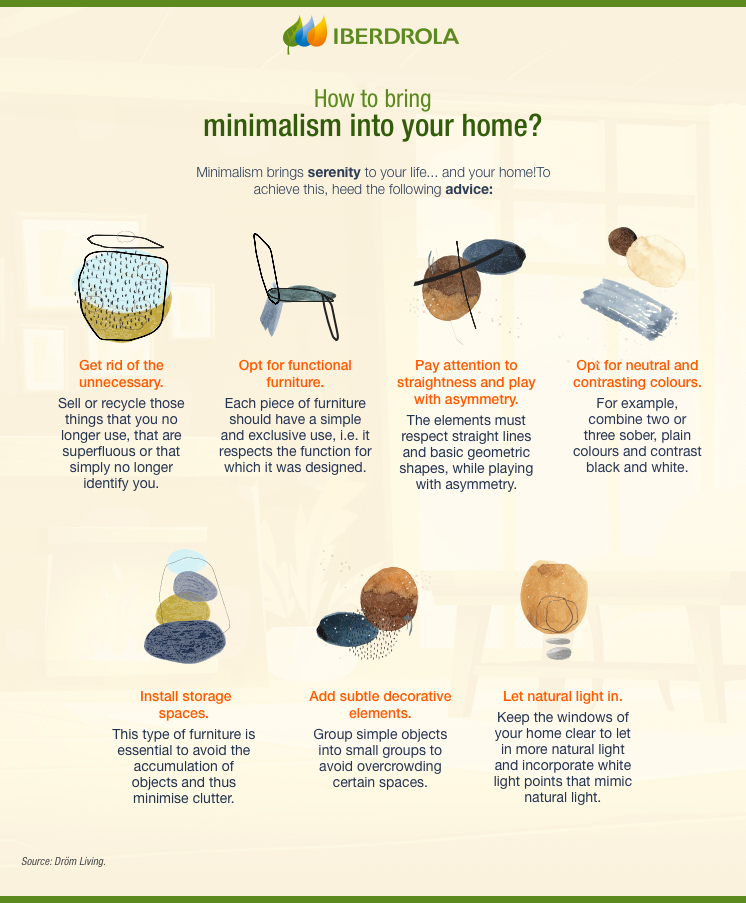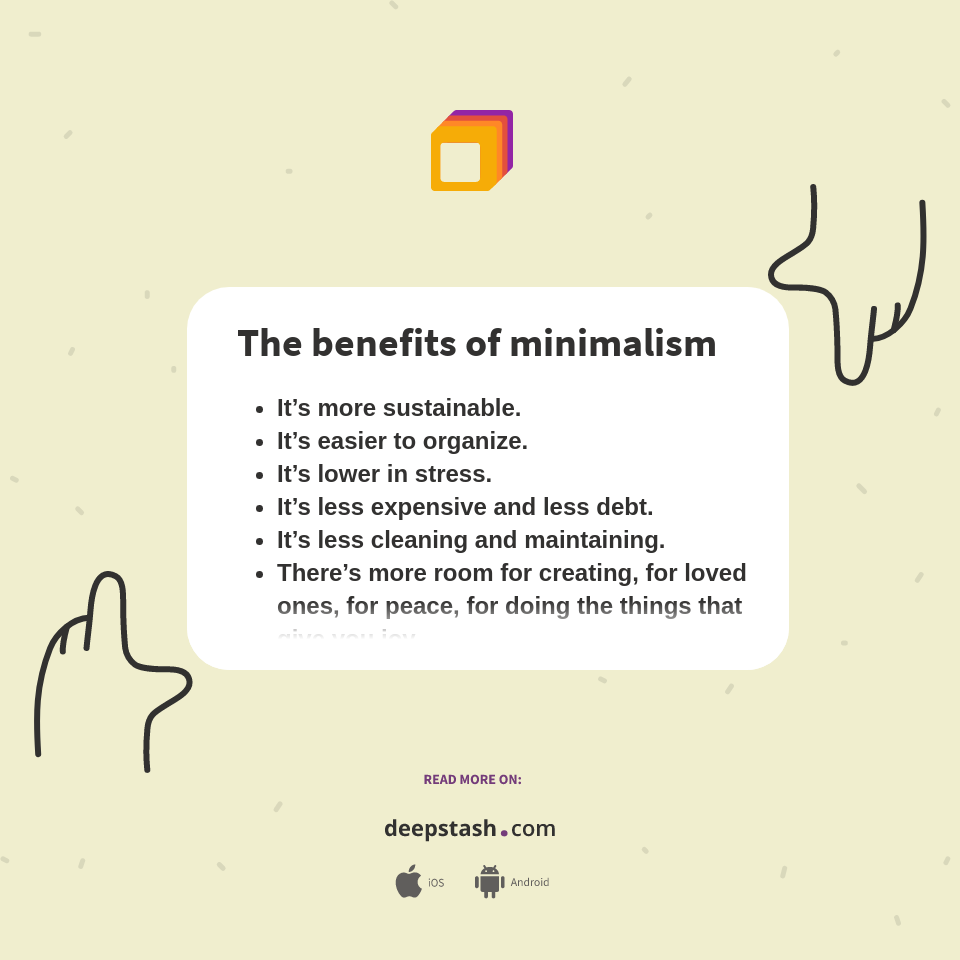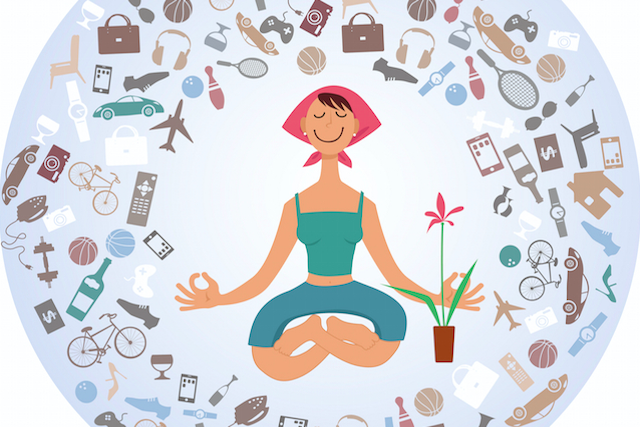The Benefits of Minimalism: Embracing a Simpler Life
In today’s fast-paced world, we are often overwhelmed by clutter—both physical and mental. This is where minimalism comes in. By adopting a minimalist lifestyle, we focus on living with less to gain more—more time, more clarity, and more joy. This article explores the many benefits of minimalism and how simplifying your life can lead to a more meaningful and fulfilling existence.

What is Minimalism?
Minimalism is the practice of intentionally simplifying various aspects of life, from possessions to time management. It’s about removing the excess to focus on what truly matters—whether that’s your health, relationships, or personal growth. Minimalism isn’t about depriving yourself; it’s about making room for the things that add value to your life.
The Core Ideas of Minimalism:
-
Fewer possessions: Keeping only items that serve a purpose or bring joy.
-
More time for important things: Reducing distractions and commitments.
-
Mindful living: Being conscious about your decisions and actions.
By embracing minimalism, you create a life that’s less about “stuff” and more about experiences and personal fulfillment.
The Key Benefits of Living Minimally
1. Reduced Stress and Anxiety
One of the most immediate benefits of minimalism is the reduction of stress. Living in a cluttered environment often leads to feelings of anxiety and being overwhelmed. By decluttering your home and mind, you create a peaceful, organized space that fosters relaxation and clarity.
Tip: Start by decluttering one room at a time. This allows you to feel a sense of accomplishment and keep the process manageable.

2. More Financial Freedom
Minimalism can significantly improve your financial situation. By focusing on quality over quantity and avoiding impulsive purchases, you can reduce your overall spending. Minimalists tend to buy only what they need, which helps avoid the cycle of consumerism that often leads to debt.
By spending less on material goods, you have more money to save, invest, or spend on meaningful experiences.
3. Increased Productivity
With fewer distractions and less clutter, minimalism helps improve your productivity. It’s easier to focus when you’re not constantly surrounded by things that need attention. Whether in your home or workplace, an organized environment promotes a more efficient and focused mindset.
4. Better Physical and Mental Health
Living minimally can enhance both your physical and mental health. A clutter-free home can reduce allergens and create a healthier living space. Minimalism also encourages a more balanced lifestyle by reducing unnecessary stressors and focusing on wellness.
A simpler life often includes prioritizing exercise, healthy eating, and adequate rest—all of which contribute to better overall health.

5. More Time for What Matters
Minimalism allows you to create more time for the things that truly matter. By decluttering your home, reducing unnecessary commitments, and simplifying your schedule, you can prioritize quality time with loved ones or focus on personal passions and hobbies.
Living simply can also give you more time to rest, recharge, and focus on self-care.
6. Stronger Relationships
Minimalism isn’t just about decluttering physical possessions; it’s also about decluttering relationships. By simplifying your life, you create more space to invest in deeper, more meaningful relationships. You’ll have more time to connect with those who truly matter and less time spent on superficial interactions.
7. Environmental Impact
Minimalism can have a positive effect on the environment. By reducing consumption, opting for sustainable products, and reusing or recycling, you contribute to reducing waste. A minimalist lifestyle often aligns with a more eco-conscious mindset, focusing on what you truly need rather than constantly acquiring new things.

How to Start Living Minimally
Adopting a minimalist lifestyle doesn’t happen overnight. It requires intentional effort and a willingness to let go of excess. Here are some practical steps to get started:
1. Declutter Your Space
Start by evaluating your belongings. Keep only the things that are useful or bring you joy. Donate, sell, or recycle items that no longer serve a purpose. Consider adopting the KonMari method for decluttering, which encourages you to keep only the items that spark joy.
2. Simplify Your Schedule
Take a hard look at your commitments. Are there activities that drain your energy or don’t align with your values? Learn to say no and prioritize activities that bring you fulfillment. By simplifying your schedule, you’ll create more space for what truly matters.
3. Be Intentional with Purchases
Before acquiring something new, ask yourself if it’s truly necessary. Is it something that will add value to your life? This mindfulness helps prevent clutter from re-entering your life and ensures that everything you own is purposeful.
4. Embrace Mindful Consumption
Minimalism encourages you to consume consciously. Opt for sustainable products, buy less but of better quality, and avoid fast fashion. Choose items that will last longer and serve you better.
5. Focus on Experiences, Not Possessions
Instead of accumulating material items, invest in experiences. Whether it’s traveling, learning a new skill, or spending time with loved ones, these experiences provide lasting fulfillment and memories that are far more valuable than any physical possession.
Common Challenges of Minimalism
While minimalism offers numerous benefits, there are some challenges you may face as you transition to a simpler lifestyle.
1. Emotional Attachment to Possessions
It can be difficult to part with items that hold sentimental value. Remember that memories are not tied to physical objects. You can preserve the emotional connection by taking photos or repurposing meaningful items in a way that aligns with your minimalist goals.
2. Pressure from Society
In a consumer-driven society, there is often pressure to keep up with trends and acquire the latest products. By staying true to your minimalist values, you can resist the urge to follow the crowd and focus on what truly adds value to your life.
3. Fear of Missing Out (FOMO)
Living minimally may lead to feelings of missing out on experiences or possessions that others may have. However, minimalism isn’t about depriving yourself—it’s about making space for what truly brings joy. By embracing a minimalist lifestyle, you create a more fulfilling, purposeful existence.
Frequently Asked Questions (FAQs)
What is the first step in adopting minimalism?
Start by decluttering your space and evaluating your possessions. Remove items that don’t add value to your life, and keep only what’s necessary or brings you joy.
How can minimalism improve my mental health?
By reducing clutter and distractions, minimalism creates a calmer environment that fosters mental clarity and focus, reducing feelings of anxiety and stress.
Is minimalism just about decluttering?
Minimalism goes beyond decluttering physical spaces. It’s about simplifying your life in every aspect—from your possessions to your schedule and relationships—so that you can focus on what truly matters.
Can minimalism help me save money?
Yes! Minimalism encourages mindful spending and helps you avoid impulse buys. By purchasing only what you truly need, you’ll save money and reduce financial stress.
Conclusion
The benefits of minimalism extend far beyond just physical decluttering. By simplifying your possessions, your schedule, and your mindset, you can create more space for the things that truly matter. Whether it’s improving your mental health, strengthening your relationships, or achieving greater financial freedom, minimalism offers a powerful path to a more fulfilling life. Start small and embrace the simplicity that comes with living minimally—your life will become clearer, calmer, and more focused.








